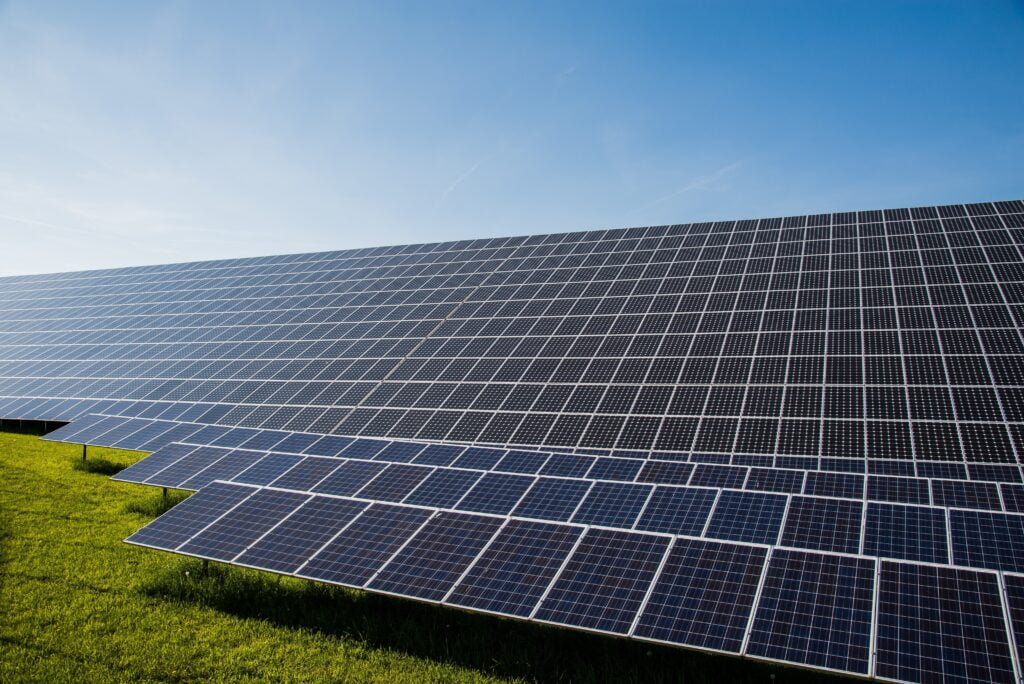If you’re considering upgrading your solar power system, lithium ion batteries are an excellent choice. They offer outstanding performance and efficiency, making them ideal for storing solar energy.
Unlike older battery technologies, lithium ion batteries can hold more energy and have a longer lifespan. This means you can get more use out of your solar power system and won’t need to replace the batteries as frequently.

In this article, we will explore how lithium ion batteries work and why they are superior to other types. We’ll delve into their benefits, including their extended lifespan, low maintenance needs, and high efficiency. By understanding these advantages, you’ll see why investing in lithium ion batteries is a wise decision for anyone looking to maximize their solar energy system.
Table of Contents
How Lithium-Ion Batteries Work
Basic Components
Lithium ion batteries consist of several essential parts:
Anode:
The negative electrode made from a material like graphite. During charging, lithium ions are stored here.
Cathode:
The positive electrode, usually composed of lithium metal oxide. It releases lithium ions during discharge.
Electrolyte:
A liquid or gel that facilitates the movement of lithium ions between the anode and cathode.
Separator:
A thin material that prevents the anode and cathode from touching each other while allowing ions to pass through.
Charging and Discharging Process
Charging:
When you charge a lithium-ion battery, electrical energy causes lithium ions to move from the cathode to the anode. This process stores energy in the battery.
Discharging:
When you use the battery, the lithium ions move back to the cathode from the anode. This movement generates electrical energy that powers your devices.

Efficiency and Performance
Lithium ion batteries are known for their high efficiency. They have a high energy density, which means they can store a large amount of energy in a small space. Additionally, they have high charge and discharge efficiency, reducing energy loss and maximizing the usable energy.
Benefits of Lithium-Ion Batteries in Solar Systems
High Energy Density
Lithium-ion batteries can store more energy per unit of volume or weight compared to many other battery types. This high energy density means you need fewer batteries to store the same amount of energy, which saves space and reduces installation costs.
Space Efficiency:
- Because they are compact, you can fit more capacity into a smaller space, making them ideal for residential and commercial solar setups where space is limited.
Long Lifespan
These batteries generally last longer than traditional lead-acid batteries. A typical lithium-ion battery can last between 10 to 15 years, while lead-acid batteries usually last around 5 to 7 years. This extended lifespan means fewer replacements and less hassle over time.

Durability:
The long life of lithium-ion batteries contributes to their cost-effectiveness. You invest more initially, but the battery’s longevity makes it a better investment in the long run.
Low Maintenance
Lithium-ion batteries require minimal maintenance compared to other types like lead-acid batteries. They do not need regular water refills or equalization charges, which simplifies upkeep and reduces maintenance costs.
Ease of Use:
Their low maintenance needs make them more convenient and user-friendly, reducing the time and effort needed to ensure proper battery care.
Fast Charging
One of the key advantages of lithium-ion batteries is their ability to charge quickly. This fast charging capability allows you to store energy more efficiently and use it when needed, enhancing the overall performance of your solar power system.
Temperature Tolerance
Lithium-ion batteries generally perform well across a range of temperatures. Although extreme temperatures can still affect their performance, they are more tolerant of temperature fluctuations compared to other battery types. This means they can operate effectively in varying environmental conditions.
Choosing the Right Lithium-Ion Battery for Your Solar System
Capacity and Voltage
When selecting a lithium-ion battery, it’s important to consider its capacity and voltage. Capacity, measured in kilowatt-hours (kWh), determines how much energy the battery can store. Voltage affects the power output of the battery. Ensure the battery you choose matches the needs of your solar power system in terms of both capacity and voltage.
Capacity Considerations:
- A higher capacity battery can store more energy, which is beneficial if you have high energy consumption or want to ensure a backup during periods of low solar production.
Brand and Model
Different brands and models of lithium-ion batteries offer various features and levels of quality. It’s important to choose a reputable brand known for reliability and performance. Research customer reviews, compare specifications, and consider warranties to find the best battery for your needs.
Reputable Brands:
Look for established brands with positive reviews and a track record of producing high-quality batteries. Brands with good customer support and warranties are preferable.
Cost vs. Benefit
While lithium-ion batteries can have a higher upfront cost compared to other battery types, their longer lifespan and lower maintenance requirements often make them a more cost-effective option over time. Evaluate the total cost of ownership, including installation and maintenance, to determine the best value.

Total Cost of Ownership:
Consider both the initial investment and the long-term savings from reduced maintenance and replacement costs to assess the overall value of the battery.
Maintenance and Care Tips
Proper Installation
Proper installation is crucial for the safety and performance of lithium-ion batteries. Ensure that your batteries are installed by a professional who follows the manufacturer’s guidelines and recommendations. Incorrect installation can lead to performance issues and safety hazards.
Proper installation of lithium-ion batteries is foundational to ensuring their optimal safety and performance within a solar energy system. Engaging a qualified professional who adheres strictly to manufacturer guidelines and industry standards is paramount.
This ensures that the batteries are securely integrated into the system, minimizing risks of short circuits, overheating, or other potential hazards that could compromise both the batteries and the overall system integrity.
A professional installer will not only handle the physical installation but also conduct thorough checks to verify proper wiring, ventilation, and environmental conditions.
These meticulous steps are crucial for mitigating operational risks and ensuring the batteries function at their peak efficiency over their lifespan. By investing in professional installation, homeowners and businesses can safeguard their investment in solar energy, optimizing both safety and long-term performance of their lithium-ion battery systems.
Professional Installation:
Hiring a qualified technician ensures that the batteries are installed correctly and safely, which can help prevent potential problems and extend the life of the batteries.
Regular Monitoring
Although lithium-ion batteries require minimal maintenance, regular monitoring is still important. Check the performance of the batteries periodically to ensure they are functioning properly. Look for any signs of issues, such as unusual noises or reduced performance.
Optimal Operating Conditions
To maintain the efficiency and longevity of your lithium-ion batteries, keep them in a clean, dry, and well-ventilated area. Avoid exposing them to extreme temperatures or direct sunlight, as these conditions can affect their performance.
Storage Conditions:
Proper storage conditions help prevent performance degradation and ensure that the batteries operate effectively over their lifespan.
The Future of Lithium-Ion Batteries in Solar Energy
Technological Advancements
Technological advancements in lithium-ion batteries are driving significant improvements in energy storage capabilities for solar energy systems. Innovations focus on enhancing energy density, allowing batteries to store more energy in smaller footprints. This translates to greater efficiency and increased capacity to harness solar power effectively, especially in limited space scenarios such as residential rooftops or urban environments.
Moreover, ongoing research aims to improve charging speeds, enabling faster replenishment of stored energy. Rapid charging capabilities are essential for maximizing the utility of solar power during peak production periods or urgent energy needs. These advancements not only enhance operational efficiency but also contribute to reducing reliance on grid electricity during high-demand periods, thereby potentially lowering overall energy costs.
Furthermore, advancements in battery technology are enhancing overall performance metrics, including durability and lifespan. Improved materials and manufacturing techniques are extending the operational life of lithium-ion batteries, making them more reliable and cost-effective over their lifecycle. These advancements in performance are crucial for ensuring long-term sustainability and reliability of solar energy systems, providing homeowners and businesses with enhanced energy independence and efficiency.
Emerging Technologies:
Watch for innovations that enhance battery efficiency and performance, which could provide even greater benefits for solar energy systems.
Increasing Affordability
As production scales up and technology improves, the cost of lithium-ion batteries is expected to decrease. This will make them more accessible and affordable for a wider range of solar energy systems, providing even more benefits to users.
Cost Reduction:
Lower costs will make lithium-ion batteries a more viable option for more people, expanding their use in solar energy systems and increasing their overall impact.
Sustainability and Recycling
There is a growing focus on sustainability and improving the recycling processes for lithium-ion batteries. Better recycling methods will reduce the environmental impact of these batteries and make their use more eco-friendly.
Environmental Impact:
Efforts to enhance recycling and reduce the environmental footprint of lithium-ion batteries are crucial for their long-term sustainability.
Conclusion
Lithium-ion batteries offer numerous advantages for solar energy systems. Their high energy density, long lifespan, low maintenance needs, and fast charging capabilities make them a superior choice for storing solar energy. By understanding how these batteries work and their benefits, you can make an informed decision about upgrading your solar power system. Investing in lithium-ion batteries is not just a smart choice; it’s a step towards a more efficient and reliable solar energy setup.
To ensure optimal performance from your lithium-ion batteries in your solar setup, consider implementing smart energy management practices. This includes integrating advanced monitoring systems that provide real-time data on battery health and performance metrics.
FAQ’s:
1. What are the advantages of using lithium-ion batteries in a solar power system?
High Energy Density:
- Lithium-ion batteries can store more energy in a smaller space, optimizing space usage.
Long Lifespan:
- Typically lasting 10 to 15 years, they outlast traditional lead-acid batteries.
Low Maintenance:
- Minimal upkeep required compared to other battery types, no regular water refills needed.
Fast Charging:
- Efficient energy storage with rapid charging capabilities.
Temperature Tolerance:
- Performs well across a range of temperatures, suitable for diverse environments.
2. How do lithium-ion batteries work in a solar setup?
Lithium-ion batteries store energy generated by solar panels during the day. The energy is stored as lithium ions move between the anode and cathode during charging and discharging processes.
3. Why are lithium-ion batteries better than lead-acid batteries for solar systems?
Lithium-ion batteries offer higher efficiency, longer lifespan, and require less maintenance compared to lead-acid batteries, making them more cost-effective in the long term.
4. What should I consider when choosing a lithium-ion battery for my solar system?
Capacity:
- Choose a battery with sufficient capacity (measured in kWh) for your energy storage needs.
Voltage Compatibility:
- Ensure the battery’s voltage matches your system requirements.
Brand Reputation:
- Opt for reputable brands known for reliability, good customer support, and warranty coverage.
Total Cost of Ownership:
- Evaluate initial costs against long-term savings from reduced maintenance and replacement needs.
5. How do I maintain lithium-ion batteries in a solar setup?
- Ensure professional installation to prevent performance issues and safety hazards.
- Monitor battery performance regularly for signs of degradation or malfunction.
- Store batteries in a clean, dry, and well-ventilated area away from extreme temperatures and direct sunlight.
6. What does the future hold for lithium-ion batteries in solar energy?
- Ongoing technological advancements aim to improve energy density, charging speeds, and overall performance.
- Expected cost reductions will make lithium-ion batteries more accessible and affordable for wider adoption in solar energy systems.
- Focus on sustainability includes improving recycling processes to reduce environmental impact.
7. Are lithium-ion batteries suitable for residential as well as commercial solar setups?
- Yes, due to their compact size, high efficiency, and scalability, lithium-ion batteries are suitable for both residential and commercial solar installations.
8. How do lithium-ion batteries contribute to a more efficient solar energy setup?
- They maximize energy storage capacity, reduce energy loss during charging and discharging, and provide fast access to stored energy when needed.
9. What should I look for in terms of technological advancements in lithium-ion batteries?
- Keep an eye on advancements that enhance energy efficiency, durability, and integration capabilities with solar systems.
10. How can I ensure I get the best performance out of lithium-ion batteries in my solar setup?
- Follow manufacturer guidelines for installation and maintenance.
- Regularly monitor battery performance and environmental conditions to optimize efficiency and longevity.
3 Responses